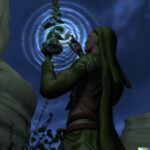Are you curious about the effects of Salvia and the different forms it comes in? In this article, we will explore the differences between Salvia extract and Salvia tea, and how they are used.
We will also discuss the effects of each form, including intense hallucinations, changes in mood, and improved mental clarity. By the end of this article, you will have a better understanding of the potency, duration of effects, method of consumption, and legal status of Salvia extract and Salvia tea, helping you to make an informed decision about which is safer to use.
What Is Salvia?
Salvia, also known as salvia divinorum, is a psychoactive plant that has been traditionally used as a natural product and herbal remedy.
Salvia, a plant belonging to the mint family, is native to the cloud forest region in Oaxaca, Mexico. Its leaves contain psychoactive compounds, including salvinorin A, which causes hallucinogenic effects when consumed.
For centuries, the Mazatec people have used salvia in spiritual rituals for its mind-altering properties. It is typically consumed by chewing the fresh leaves or brewing them into a tea. Due to its unique chemical makeup, salvia has caught the attention of researchers investigating its potential therapeutic benefits in treating neurological and psychological conditions.
What Are The Different Forms Of Salvia?
Salvia is available in various forms, with the most common being salvia extract and salvia tea, each requiring different methods of ingestion and preparation.
What Is Salvia Extract?
Salvia extract is a concentrated form of salvia that is typically ingested through smoking or vaporization. It is known for its heightened potency and rapid consumption.
It is important to note that the potency of salvia extract is significantly higher than that of the raw plant, making it a powerful substance that should be approached with caution.
When consumed, the effects of salvia extract are usually felt within seconds. It induces intense hallucinations and altered perceptions. Due to its concentrated form, only a small amount is required to experience its full effects, contributing to its rapid consumption.
The methods of ingestion, such as smoking or vaporization, allow for the quick and efficient delivery of the active compounds, intensifying the impact of the extract.
What Is Salvia Tea?
Salvia tea is a traditional preparation of salvia leaves, commonly consumed for its psychoactive effects and prepared through a specific infusion method.
The process of making salvia tea involves steeping the dried leaves or using fresh ones in hot water, allowing the active compounds to infuse into the liquid. This infusion is then strained, and the resulting tea can be consumed.
Traditionally, salvia tea has been used in shamanic rituals by indigenous cultures for its hallucinogenic properties. When consumed, the effects of salvia tea can include altered perceptions of reality, heightened sensory experiences, and introspective states. It’s essential to approach its consumption with caution due to its potent psychoactive nature.
How Is Salvia Used?
Salvia is typically used through ingestion, with dosing recommendations emphasizing responsible use and moderation.
It is important for individuals to carefully measure and monitor their intake, especially when using salvia extracts or concentrated forms. Taking smaller doses initially and gradually increasing as needed can help users avoid overwhelming experiences.
Users are encouraged to create a safe and comfortable environment, and to have a trusted friend present when trying salvia for the first time. Being mindful of individual tolerance levels and avoiding mixing salvia with other substances are essential aspects of responsible consumption.
What Are The Effects Of Salvia Extract?
Salvia extract is known for producing intense hallucinations and mind-altering effects, with potential health implications for users.
The psychoactive impact of salvia extract can induce vivid perceptual distortions, such as altered visual perception and distorted sense of time and space. This intense alteration of consciousness can lead to profound introspection and spiritual experiences, yet it also carries potential risks, including increased heart rate, anxiety, and paranoia.
The hallucinogenic effects of salvia extract can be overwhelming, causing users to lose touch with reality and experience a strong feeling of disconnection from their surroundings. It’s essential to approach the use of salvia extract with caution and awareness of its potential health considerations.
Intense Hallucinations
Salvia extract can induce intense hallucinations and a deeply psychoactive experience, often described as surreal and disorienting.
Users commonly report vivid visual distortions, such as seeing patterns and colors that appear to come to life in front of their eyes. The sensation of time distortion is also frequently mentioned, with minutes feeling like hours and vice versa.
Some individuals have shared experiences of feeling transported to alternate realities or dimensions, blurring the line between what is real and what is imagined. It’s important to note that these hallucinogenic effects can vary widely from person to person, making the salvia experience deeply personal and unpredictable.
Distorted Perception of Time and Space
Salvia extract can lead to a distorted perception of time and space, often sought after for its recreational use and mind-altering properties.
Users of salvia extract often report experiencing a heightened sense of detachment from their surroundings, with time feeling elongated or compressed, and space appearing to warp and take on surreal qualities. This altered state of perception can create a sense of euphoria and detachment from reality, making it a popular choice for those seeking mind-bending experiences.
The recreational consumption of salvia extract offers users a temporary escape from conventional notions of time and space, allowing for explorations of the boundaries of consciousness and reality.
Changes in Mood and Emotions
Salvia extract can induce changes in mood and emotions, leading to experiences often associated with spiritual practices and introspective journeys.
This natural substance is known for its potential to evoke feelings of interconnectedness and mindfulness, allowing individuals to delve deep into their thoughts and emotions.
Many users report experiencing heightened awareness and a sense of oneness with the universe, which can lead to profound spiritual experiences. The introspective nature of salvia extract can also promote self-reflection and facilitate emotional processing, making it a valuable tool for those seeking inner growth and understanding.
What Are The Effects Of Salvia Tea?
Salvia tea is known to produce mild hallucinations and is often consumed within traditional medicine as a means of holistic healing.
The mild hallucinogenic properties of salvia tea can induce a sense of relaxation, altered perception, and vivid dreams. For centuries, various cultures have incorporated salvia tea into healing practices to address issues related to anxiety, depression, and spiritual alignment.
Its association with traditional medicine and holistic healing reflects its cultural significance in promoting overall well-being and mental clarity. This herbal remedy continues to intrigue researchers and practitioners due to its potential therapeutic effects on the mind and body.
Mild Hallucinations
Consuming salvia tea can lead to mild hallucinations with potential health implications, especially when considering its ingestion method.
The ingestion of salvia tea may cause altered perception, such as visual distortions and changes in mood, due to the presence of the active ingredient salvinorin A.
It’s important to note that individuals with mental health conditions, such as anxiety or schizophrenia, may be more susceptible to adverse effects from the hallucinogenic properties of salvia tea.
The potential for disorientation and impaired cognitive function during the hallucinogenic experience underscores the importance of consuming it in a controlled and safe environment.
Relaxation and Euphoria
Salvia tea is known to induce feelings of relaxation and euphoria, offering potential benefits for individuals seeking emotional relief and tranquility.
The calming effects of salvia tea can bring about a sense of serenity and peacefulness, helping to alleviate stress and anxiety.
Many people find that a cup of salvia tea at the end of a long day can help them unwind and let go of tension. It has been reported to uplift mood and promote a positive emotional state, making it a natural and holistic way to support emotional well-being.
The soothing properties of salvia tea have been valued by those aiming to attain emotional balance and harmony in their lives.
Improved Mental Clarity
Consuming salvia tea may lead to improved mental clarity, attributed to its active compounds and the context of consumption.
The active compounds in salvia tea, such as rosmarinic acid and sage leaves, have been associated with potential cognitive benefits.
When consumed in a quiet and relaxed setting, the calming effects of salvia tea may help in reducing stress and promoting mental focus.
The ritualistic nature of brewing and sipping the tea can contribute to a sense of mindfulness, further enhancing mental clarity.
The combination of these factors suggests that salvia tea could play a role in supporting cognitive enhancement and overall brain function.
What Are The Differences Between Salvia Extract And Salvia Tea?
The differences between salvia extract and salvia tea encompass variations in potency, duration of effects, method of consumption, and legal status.
Potency
One of the key differences lies in the potency, with salvia extract being significantly more potent than salvia tea, leading to distinct consumption risks.
Salvia extract is known for its concentrated form, which can cause intense hallucinations and altered states of consciousness, even in small doses. This poses potential risks for inexperienced users.
On the other hand, salvia tea is less potent and may require higher quantities to achieve similar effects. This can increase the risk of overconsumption and its associated adverse effects. It’s crucial for individuals to be aware of these varying potencies and consumption risks when considering the use of salvia products.
Duration of Effects
The duration of effects differs between salvia extract and salvia tea, impacting the overall experience and usage patterns of each form.
Salvia extract, due to its concentrated nature, often leads to a more intense and shorter-lasting experience, with effects typically subsiding within 5-15 minutes.
On the other hand, salvia tea, being less potent and usually consumed in larger quantities, tends to create a milder but longer-lasting effect that can extend up to 30-60 minutes. These variations significantly influence how users approach their use, with salvia tea often favored for a more prolonged and gentle journey, while salvia extract appeals to those seeking a quick and powerful experience.
Method of Consumption
Salvia extract and salvia tea differ in their method of consumption, with implications for ingestion safety and responsible usage.
Salvia extract is typically consumed by smoking or vaporizing, which raises concerns about lung health and the potential harm from inhaling smoke. In contrast, salvia tea is ingested orally, which may be perceived as a safer method of consuming the herb.
It’s essential to consider dosage control and the variability in potency between different batches of salvia tea. Both consumption methods require careful attention to dosage and an understanding of the potential risks associated with ingesting salvia. Responsible usage includes researching the effects and consulting with a healthcare professional before consumption.
Legal Status
The legal status of salvia extract and salvia tea varies, with differing levels of legal risks and considerations associated with their use.
Salvia extract is often regarded as more controversial in terms of legality, as it is frequently subject to stricter regulations due to its concentrated form and potential for misuse.
On the other hand, salvia tea, being a less concentrated and more traditional preparation, may be viewed differently.
The legal risks associated with each form of salvia may depend on jurisdictional laws and regulations, making it essential for individuals to thoroughly understand the specific legal considerations applicable to their region before use.
Which Is Safer To Use: Salvia Extract Or Salvia Tea?
Determining the safety of salvia extract versus salvia tea involves assessing the associated risks and potential health implications of their consumption.
When considering salvia extract and salvia tea, it’s important to evaluate their impact on heart health, as they may increase heart rate and blood pressure. Potential interactions with medications and existing health conditions should be thoroughly examined.
Another crucial aspect is the risk of mental health effects, including hallucinations and disorientation. The influence of long-term use on cognitive function and overall well-being should not be overlooked. Evaluating these factors is essential to make informed decisions regarding the consumption of salvia products.
Frequently Asked Questions
What is the difference between Salvia Extract and Salvia Tea?
Salvia Extract and Salvia Tea are two different preparations of the same plant, Salvia divinorum. The main difference is in their potency and method of consumption.
Is Salvia Extract more potent than Salvia Tea?
Yes, Salvia Extract is typically more concentrated and therefore more potent than Salvia Tea. This is because the extract contains a higher concentration of the active ingredient, salvinorin A.
How is Salvia Extract made?
Salvia Extract is made by extracting the active compounds from the Salvia divinorum plant using solvents such as ethanol or butane. The resulting material is then dried to create a concentrated powder or liquid.
How is Salvia Tea made?
Salvia Tea is made by steeping dried Salvia divinorum leaves in hot water, similar to how traditional tea is made. The resulting brew is then consumed to experience the effects of the plant.
Which method of consumption is safer?
Both Salvia Extract and Salvia Tea can be consumed safely when used in moderation and with proper precautions. However, due to the higher potency of Salvia Extract, it is important to carefully measure and regulate the dosage to avoid negative side effects.
What are the effects of Salvia Extract compared to Salvia Tea?
The effects of Salvia Extract are typically more intense and shorter-lasting compared to Salvia Tea. This is due to the higher concentration of salvinorin A in the extract. Salvia Tea may produce a milder and longer-lasting experience.
John Marston, a seasoned writer since 2009, has penned hundreds of articles on Salvia Divinorum across the web. As a full-time writer at a prominent online salvia retailer, he continues to contribute valuable insights, combining expertise and passion to unravel the diverse facets of Salvia Divinorum. Beyond his writing, John serves as a budtender in the cannabis industry.




